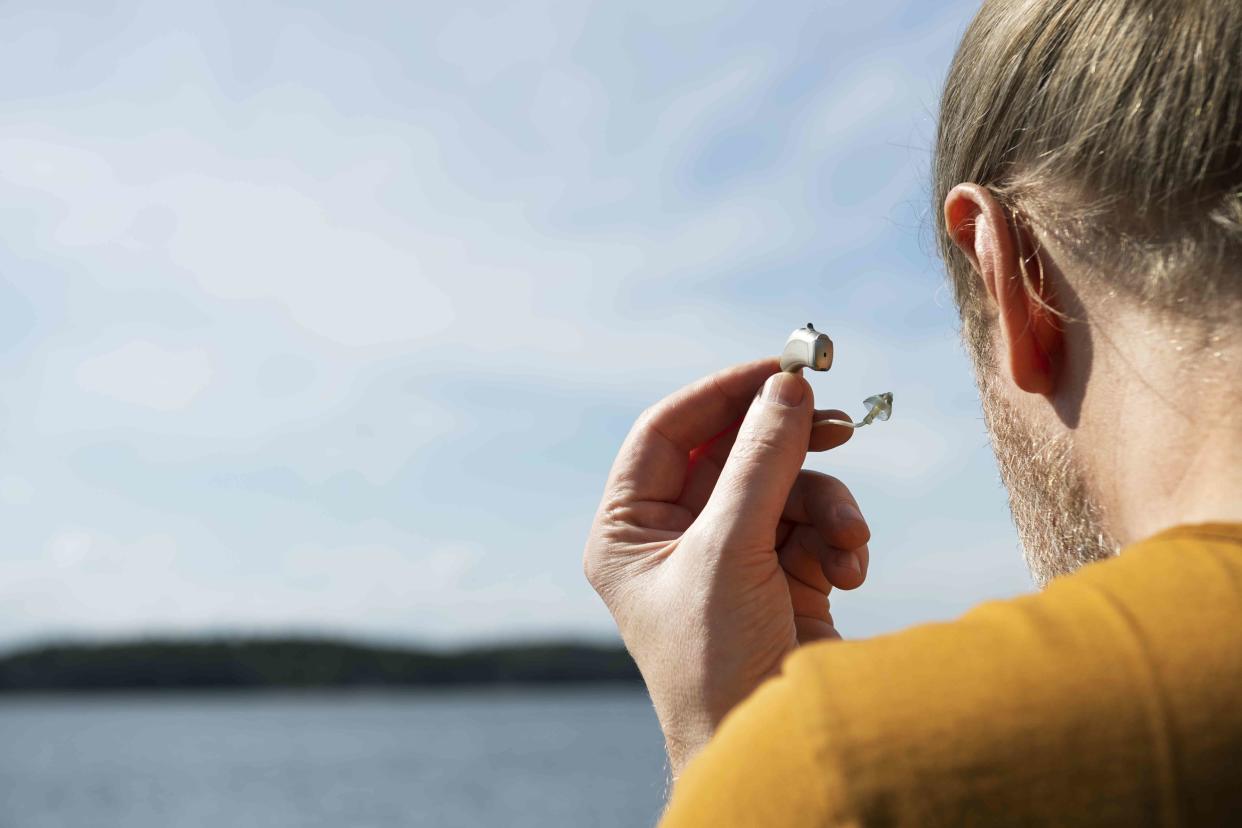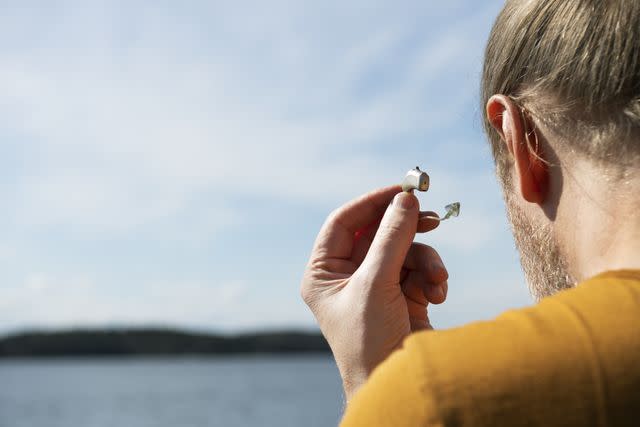Should You Start Wearing Hearing Aids? Experts Note the Benefits

Getty Images / Johner Images
Fact checked by Nick Blackmer
About 13% of adults over the age of 18 experience at least some hearing loss.
While hearing aids are stereotypically worn by older individuals, some experts note that beginning to wear hearing aids earlier in life could serve as a preventative measure.
Experts strongly advise individuals of all ages to be aware of close proximity to loud sounds, and use ear muffs or ear plugs to drown out those elevated noises when possible.
Hearing aids aren’t just useful after your hearing has been severely damaged, experts suggest that younger people turn to hearing aids as a form of hearing damage prevention.
Hearing aid technology has significantly progressed in recent years. Simultaneously, younger generations are experiencing hearing loss earlier in life.
The Centers for Disease Control and Prevention (CDC) estimates that about 13% of adults over age 18 have some hearing loss.
The recent attention on hearing loss in younger generations has been a critical driver of acceptance of hearing aids among younger people, Shannon M. Van Hyfte, AuD, CCC-A, clinical associate professor in the department of speech, language, and hearing sciences at Purdue University, told Health.
Anecdotally, Van Hyfte said she’s seen more people in their 40s, 50s, and 60s seeking out hearing aids. Historically, her patients being fitted for hearing aids have been in their 70s.
According to the Hearing Loss Association of America, patients generally wait an average of 7 years to take action from the time they recognize they’re hard of hearing.
But a number of factors converging have begun to normalize hearing aids, especially as sleeker options hit stores.
“There’s been this trifecta in the past 5 years or so of people being more aware of hearing loss, people having more desire to protect hearing, and over-the-counter hearing aids coming on the market,” Van Hyfte explained, adding that mask-wearing during the pandemic also likely drove more awareness of hearing loss that people didn’t realize they had until visual cues were taken away.

Getty Images / Johner Images
Related: Should You Buy Hearing Aids at Costco?
Can Using a Hearing Aid Earlier in Life Cause Harm?
According to Timothy Hullar, MD, a professor of otolaryngology at the Oregon Health and Science University School of Medicine, the short answer is no, you will not cause damage by starting to wear a hearing aid earlier in life.
“The logic might be that people think their ears will get lazy—the concept of use it or lose it—but the ears don’t get tired,” Dr. Hullar said. “What you’re really trying to do is help the brain hear things and understand things that are in the auditory world around you.”
Hearing damage is caused by excess noise that reaches the ear drum. Although it’s possible to turn the volume up on a hearing aid, most models have a system that limits the amount of noise being amplified.
Dr. Hullar noted that modern-day hearing aids often connect to peoples’ TVs or phones through Bluetooth. This allows people to hear media exceptionally well while potentially reducing the volume at which people listen to shows, movies, and music.
Additionally, Dr. Hullar said using over-the-counter hearing aids can be a good option for people who are just starting to experience hearing loss and would like to try them out. Van Hyfte went a step further, recommending that anyone who thinks they may benefit from a hearing aid get a custom-fitted device following a hearing test.
“I don’t see using hearing aids earlier in life as a big threat,” she said. “I actually am more fearful that people will have a negative experience and equate that to what all hearing aids might be like.”
Over-the-counter hearing aids can be pricey, and people may need to try a few before they find one that’s right for them, which can end up costing more than a visit to a hearing specialist, even when insurance doesn’t cover the visit, she added.
The devices also work differently than prescription hearing aids.
When ordering a prescription hearing aid, an audiologist will put details about a person’s hearing loss into a computer and digitally program a chip in the device. That chip will make sure the hearing aid only amplifies the frequencies the person needs amplified, and only by the amount they need.
Hearing aids may also need reprogramming about every 5 to 7 years, as a person’s hearing changes.
“That gives a tailored hearing experience whereas the OTC hearing aid is a more broad approach—like when you turn your music up in your earbuds and everything goes up rather than just certain frequencies,” Van Hyfte explained. “Nothing is one size fits all when it comes to our ears, even between the right and left ears.”
Protection Is Key, With or Without a Hearing Aid
Whether or not someone is choosing to use a hearing aid, the basis of hearing health is rooted in protection.
“The first thing is to know when your hearing is at risk,” said Dr. Hullar. “Anytime people are in an environment where their ears ring afterward, their hearing has been damaged and we currently don’t have any way of overcoming that other than a hearing aid.”
How much hearing loss a person experiences from an event depends on how long someone’s ears are enduring it. Dr. Hullar emphasizes the importance of minimizing your overall lifetime exposure to damaging noise and thinking about mitigation strategies the same way you think about sunscreen.
Using noise-canceling ear muffs and ear plugs at noisy events or while close to loud noise for a period of time—like while mowing the lawn—is one of the best ways to avoid damage.
“We know that hearing loss from noise is 100% preventable if we have the right kind of hearing protection,” Van Hyfte added.
Everyday exposure to noise can also cause accumulative damage. Dr. Hullar recommends being extra cautious when listening to music or calls through headphones that are not noise-canceling.
“Because they don’t filter out other noise, they could cause people to listen to things louder,” he explained, noting that noise-canceling headphones can be safer for hearing health.
Van Hyfte offered another rule of thumb people can use to protect their hearing in everyday situations: “If you are talking to somebody an arm’s length away and you need to raise your voice to be heard, that’s too loud.”
Related: The 12 Best Hearing Aids of 2022
For more Health news, make sure to sign up for our newsletter!
Read the original article on Health.

